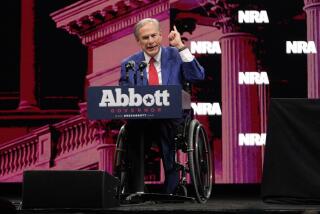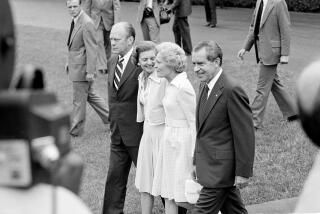Personal side to a pardon
- Share via
WASHINGTON — Months before President Nixon set a relatively unknown Michigan congressman named Gerald R. Ford on the path to the White House, Nixon turned to Ford, who called himself the beleaguered president’s “only real friend,” to get him out of trouble.
During one of the darkest days of the Watergate scandal, Nixon secretly confided in Ford, at the time the House minority leader. He begged for help. He complained about fair-weather friends and swore at perceived rivals in his own party, in one call recorded by the president’s secret taping system.
“Anytime you want me to do anything, under any circumstances, you give me a call, Mr. President,” Ford told Nixon in that May 1, 1973, conversation.
This and other previously unpublished transcripts of their calls, documents and personal letters provide a portrait of an intensely personal friendship dating to the late 1940s but so hidden that few others were even aware of it. Until now, the relationship between the two presidents has been portrayed largely as a matter of political necessity, with Nixon tapping Ford for the vice presidency in late 1973 because he was a confirmable choice on Capitol Hill.
But the tapes, documents and two recent interviews with Ford, conducted for a future book and embargoed until after his death, show that the close political alliance between the two men seriously influenced Ford’s decision to pardon Nixon.
“I looked upon him as my personal friend. And I always treasured our relationship,” Ford said in the interview.
In earlier statements, Ford had emphasized the decision as an effort to move the country beyond the Watergate era, playing down the personal dimension.
More to Read
Sign up for Essential California
The most important California stories and recommendations in your inbox every morning.
You may occasionally receive promotional content from the Los Angeles Times.













